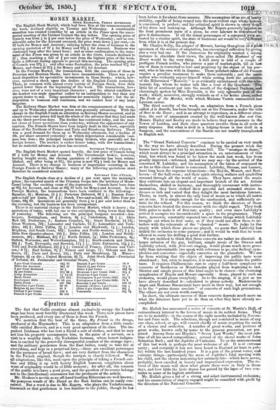The "Grand National Concerts" continue to be carried on very
much in the way we have already described. During the present week the houses have been good but by no moans full. The " muaique de denser which must always be a principal attraction in an entertainment of this but which was found to be below the mark last week, has been greatly improved—reformed, indeed we may say—by the arrival of the renowned M. Labitzky, and his assumption of the baton of command ism so far as this class of music is concerned. Labitzky, Strauss, and Lamer, have long been the supreme triumvirate—the Haydn, Mozart, and Beet- hoven—of the ball-room ; and their spirit-stirring waltzes and quadrilles resound through all the world of music. They have raised the music they cultivate into an elegant and important branch of the art, Artiste themselves, skilled in harmony, and thoroughly conversant with instru- mentation, they have clothed their graceful and animated strains in. dresses so rich and varied that they delight the most fastidious listener.. Theirs, in truth, is almost the only kind of music as to which all tastes are at one. It is simple enough for the uneducated, and sufficiently ar- tistic for the refined. For this reason, we think the directors of these concerts have treated the dance-music with too alight regard. They took little pains to make it of first-rate quality ; and even since Labitzkya arrival it occupies too inconsiderable a space in the programmes. They have, moreover, constantly repeated two or three things which Labitzky brought out when he first came, as if they could not allow them to in- terfere with the rehearsals of the "classicel " music. To judge by the nicety with which these pieces are played, we guess that Labitzky has. drilled the orchestra to some purpose ; and it would be well that he were allowed to carry his drilling a good deal further. We are inclined to think that these concerts are rather too classical. A larger infusion of the gay, brilliant, simple music of the Strauss and Labitzky school, with first-rate singuig, would please much more gene- rally than interminable (we speak with reference to po;.ular feeling) sym- phonies and concertos—especially concertos on the pianoforte. We are far from wishing that the object of improving the public taste were abandoned ; but, even to improve, it is necessary to conciliate the public. taste. It requires Philharmonic ears to enjoy a half-hour symphony or concerto of Beethoven or Mendelssohn played from beginning to end. Shorter and simple pieces of this kind ought to be chosen—the charming symphonies of Haydn and Mozart especially : those played by such an orchestra, would please everybody. As to the singing, it. is just as we have already described it— calculated to please nobody. Mademoiselle Angri and Madame Biscaccianti have merit in their way, but not enough to be the " prime donne asaolute" of concerts of such high pretensions.. The others are not even worth. naming.
In short, the ultimate success of these concerts depends much more on what the directors have yet to do than on what they have already ac- complished.


























 Previous page
Previous page